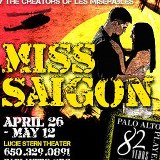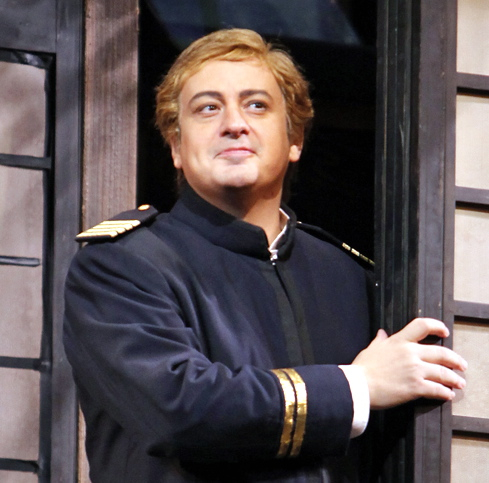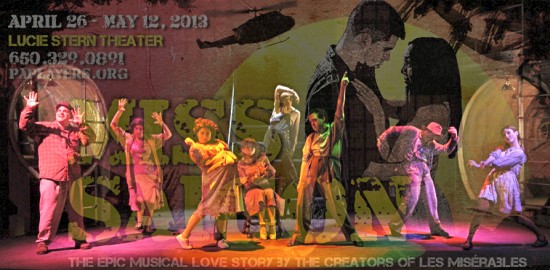An American serviceman in the Far East has a happy liaison with a young native woman that is solemnized in a native ceremony. He is suddenly transferred away leaving her behind. Three years pass. He returns to the United States and marries an American woman. Unknown to him, he is the father of a son by his native wife, who never gives up hope of being reunited with her husband. The reunion, however, is tragic. The native wife gives up her son to his father and commits suicide.
I have just given you the plot of Puccini’s Madama Butterfly, an opera that I have seen many times, the most recent being the 2010 SF Opera performance starring Svetla Vassileva. Right? Well, half right. It is also the plot of Claude-Michel Sch�nberg’s Miss Saigon, which I saw in April 2013 for the first time. Yes, every word in the first paragraph was carefully chosen to apply to either of those two productions. But for all that identity, the two stories are very different.
First, there are the obvious differences: one is set in peacetime Japan at the beginning of the twentieth century; the other in Vietnam and Thailand around the closing days of the Vietnam War in 1975. One is an opera with super-titles and no mikes, the other a musical with no super-titles and miked singers. And Puccini and Sch�nberg have very different ideas about music!
The roles are parallel, but the people are very different. Cio-Cio San is an accomplished 15-year old Geisha from an honorable Japanese family who looks forward with joy to an arranged marriage to an American. Kim is a 17-year-old orphan forced to make her own living. This is her first night working at a sleazy nightclub whose patrons “rent” the performers when the club closes. Kim is frightened and shy, knowing she will lose her virginity that night but with no knowledge as to with whom.
Three years later Cio-Cio San is still living in the same house with her 2-year old son and her faithful servant and friend Suzuki. She is still trusting Pinkerton’s lightly given words: “I’ll return when the robins nest again,” and takes comfort in telling herself that maybe American robins don’t nest every year. She confidently awaits her husband’s return as her money slowly drains away. Kim has no money to drain away. She does what she has to do for the sake of her son, hoping against hope that someday she will be reunited with her husband. She never doubts that he still loves her but faces the realistic thought that she may be difficult to find.
The stories seem to get closer near the end. The couples make contact. The women learn that their husbands have American wives and will not return to them. They decide that their sons’ best chance for a happy life is to be brought up by their fathers, and they take their own lives. Cio-Cio San reads the words engraved on the sword given to her father by the Imperial Emperor: “It is better to die with honor than to live without it,” (which means “After what has happened the only honorable course left for you is to commit hara-kiri”), and kills herself. The word “Honor” does not appear in Miss Saigon, nor does the concept. Kim is a strict realist. She knows that her husband will not accept their son as long as she is alive, so she shoots herself, leaving him no choice.
Except that the two men are both American Military Men in their early 20’s, they are from different planets. Pinkerton is self-centered and totally selfish. Cio-Cio San is not a real woman in his mind, only a charming Japanese doll who will make his stay in Japan much more pleasant. When his ship sails away he will leave her behind without a regret or even a thought, looking forward to his return to America and finding a “real wife”.
Chris is a disillusioned Marine GI. He is seeing the horror of war and he doesn’t like it. He comes to the nightclub bored and unhappy, and the tawdry women who proposition him merely increase his despondency. However, he takes pity on the timid Kim. They spend the night together and by morning they are each in love with the other – totally and sincerely on both their parts. Chris tells Kim not to go back to the club; they will live together as long as he is there, and when he leaves he will take her to America with him.
Of course it doesn’t work out that way. In the middle of the day all Americans are told to drop everything and go directly to the American Embassy for immediate evacuation. Against his will, Chris leaves Saigon without even saying goodbye to Kim. Back in the US as a civilian he faces reality. It is unlikely that Kim survived the bloody Fall of Saigon, and there is no way he could find her if she did. He forces himself to store the past as a beautiful memory and get on with his life.
The two stories have, for the most part, corresponding supporting roles filled by very different characters. The men each have a friend and enabler. Sharpless, the US Consul at Nagasaki, is perhaps opera’s prime example of a well-meaning character who is totally ineffective.
In contrast, John initiates the contact between Chris and Kim in an effort to cheer up his GI buddy while easing her first night as a prostitute. When the planned one-night-stand turns into true love, he covers for Chris at first, but at the critical time of the evacuation he forcibly keeps him from ruining his career and his life by going AWOL and literally drags him aboard the helicopter. Later, in Act II he shows his own personality by leading a male chorus of Marine vets in a heart-warming song of sympathy for all the Vietnamese children left parentless and homeless by the American army.
Pinkerton’s American wife Kate is an insignificant figure with no personality of her own. Her counterpart Ellen is a feisty woman who shows love and sympathy for Kim but has no intention of giving up her husband.
There is a rough correspondence between the Marriage Broker (Goro) and the Engineer (Tran Van Dinh) – each has a hand in bringing the lead couple together. But Goro’s part in the plot is quite minor – he serves mainly as somewhat comic relief. The Engineer, on the other hand, is a third lead in Miss Saigon. He is a small-time promoter, half-French, half-Vietnamese, with his own agenda – “I want to get to America”. When he learns that Kim has a son with an American father, he installs himself as Kim’s uncle, seeing this as a possible way to achieve his dream.
The net result of all these objective differences is that I had very different emotional reactions to the two productions. The music, the craftsmanship, and the beauty of Madama Butterfly are so great that I have never seen a performance that I didn’t like. At its best it leaves me intensely moved; it is a beautiful, beautiful tragic fairy tale. I will jump at the next chance I get to see it again – and probably go more than once.
In stark contrast, Miss Saigon is not a fairy tale. It is real. I lived through those three years. Although I did not know personally any of the US soldiers in Vietnam, I read the daily paper and wished it were not real. And a generation later I read the newspaper accounts of Iraq and Afghanistan and wished they were not real. “When will we ever learn? When will we ev�er learn?”
Would I go see it again? Yes; definitely yes. But not two or three times in the same month. This once will last me at least a year.
SFOpera photos by Cory Weaver, San Francisco Opera
All other photos by Joyce Goldschmid
Palo Alto Players
Lucie Stern Theater
1305 Middlefield Road
Palo Alto, CA 94301
Phone: 650.329.0891
email: info@paplayers.org
This review by Philip G Hodge appeared in sanfranciscosplash.com on May 18, 2013.










